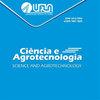The role of the genetic diversity of Capsicum spp. in the conservation of the species: Qualitative and quantitative characterization
IF 0.9
4区 农林科学
Q2 AGRICULTURE, MULTIDISCIPLINARY
引用次数: 0
Abstract
ABSTRACT Peppers need to be characterized for the in situ conservation of species that might be important for breeding purposes. In this study, we characterized the diversity of 23 pepper genotypes through eight qualitative and 12 quantitative descriptors. The pepper samples were collected from the city of Manaus and in the municipalities of Rio Preto da Eva and Iranduba in the state of Amazonas. We performed descriptive analysis, analysis of variance, Pearson’s correlation analysis, and principal component analysis (PCA) and used the unweighted pair group method with arithmetic mean (UPGMA) to analyze the data. The differences between the genotypes for all descriptors evaluated were significant. Among the genotypes collected, four pepper species were identified, including Capsicum chinense (14 genotypes), Capsicum frutescens (two genotypes), Capsicum baccatum (one genotype), and Capsicum annuum (four genotypes), and two other genotypes were obtained with unidentified species. The PCA and UPGMA clustering methods could be used to efficiently differentiate between the genotypes by applying quantitative and qualitative descriptors of fruits and seeds. These methods helped to identify different genotypes (G1 and G15) and separate them into distinct groups associated with the distribution of species based on quantitative data only. Overall, our findings suggested that the genetic variability in Capsicum available in the State of Amazonas might be useful in breeding programs.辣椒属遗传多样性在物种保护中的作用:定性和定量分析
辣椒品种的就地保护可能对育种有重要意义,因此需要对辣椒进行鉴定。本研究通过8个定性描述符和12个定量描述符对23个辣椒基因型的多样性进行了鉴定。这些辣椒样本是从玛瑙斯市、亚马逊州的巴布普雷图达伊娃市和伊兰杜巴市收集的。我们采用描述性分析、方差分析、Pearson相关分析和主成分分析(PCA),并采用算术平均数(UPGMA)的非加权配对组方法对数据进行分析。所有描述子的基因型之间的差异是显著的。在收集到的基因型中,鉴定出4种辣椒,包括中国辣椒(14种基因型)、果辣椒(2种基因型)、巴卡塔辣椒(1种基因型)和年辣椒(4种基因型),以及2种未知品种的基因型。PCA和UPGMA聚类方法可以利用果实和种子的定量和定性描述符有效区分基因型。这些方法有助于识别不同的基因型(G1和G15),并根据物种分布仅基于定量数据将其划分为不同的组。总的来说,我们的研究结果表明,亚马逊州辣椒的遗传变异可能对育种计划有用。
本文章由计算机程序翻译,如有差异,请以英文原文为准。
求助全文
约1分钟内获得全文
求助全文
来源期刊

Ciencia E Agrotecnologia
农林科学-农业综合
CiteScore
2.30
自引率
9.10%
发文量
19
审稿时长
6-12 weeks
期刊介绍:
A Ciência e Agrotecnologia, editada a cada 2 meses pela Editora da Universidade Federal de Lavras (UFLA), publica artigos científicos de interesse agropecuário elaborados por membros da comunidade científica nacional e internacional.
A revista é distribuída em âmbito nacional e internacional para bibliotecas de Faculdades, Universidades e Instituições de Pesquisa.
 求助内容:
求助内容: 应助结果提醒方式:
应助结果提醒方式:


